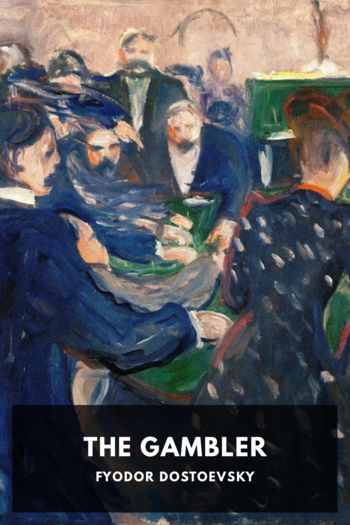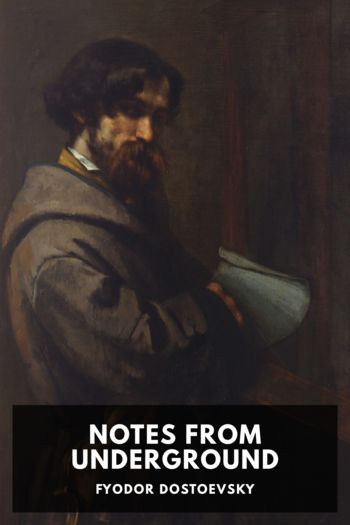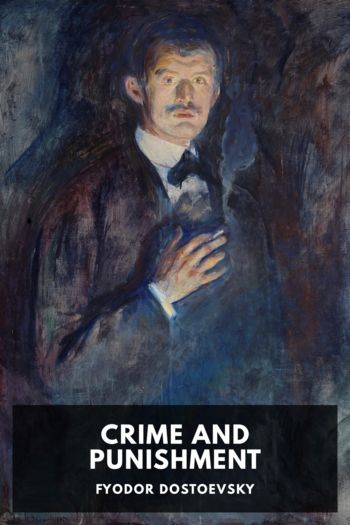The Brothers Karamazov by Fyodor Dostoevsky (i love reading books .txt) 📕

- Author: Fyodor Dostoevsky
Book online «The Brothers Karamazov by Fyodor Dostoevsky (i love reading books .txt) 📕». Author Fyodor Dostoevsky
With a feeling of disgust and irritation he tried to pass in at the gate without speaking or looking at Smerdyakov. But Smerdyakov rose from the bench, and from that action alone, Ivan knew instantly that he wanted particularly to talk to him. Ivan looked at him and stopped, and the fact that he did stop, instead of passing by, as he meant to the minute before, drove him to fury. With anger and repulsion he looked at Smerdyakov’s emasculate, sickly face, with the little curls combed forward on his forehead. His left eye winked and he grinned as if to say, “Where are you going? You won’t pass by; you see that we two clever people have something to say to each other.”
Ivan shook. “Get away, miserable idiot. What have I to do with you?” was on the tip of his tongue, but to his profound astonishment he heard himself say, “Is my father still asleep, or has he waked?”
He asked the question softly and meekly, to his own surprise, and at once, again to his own surprise, sat down on the bench. For an instant he felt almost frightened; he remembered it afterwards. Smerdyakov stood facing him, his hands behind his back, looking at him with assurance and almost severity.
“His honor is still asleep,” he articulated deliberately (“You were the first to speak, not I,” he seemed to say). “I am surprised at you, sir,” he added, after a pause, dropping his eyes affectedly, setting his right foot forward, and playing with the tip of his polished boot.
“Why are you surprised at me?” Ivan asked abruptly and sullenly, doing his utmost to restrain himself, and suddenly realizing, with disgust, that he was feeling intense curiosity and would not, on any account, have gone away without satisfying it.
“Why don’t you go to Tchermashnya, sir?” Smerdyakov suddenly raised his eyes and smiled familiarly. “Why I smile you must understand of yourself, if you are a clever man,” his screwed-up left eye seemed to say.
“Why should I go to Tchermashnya?” Ivan asked in surprise.
Smerdyakov was silent again.
“Fyodor Pavlovitch himself has so begged you to,” he said at last, slowly and apparently attaching no significance to his answer. “I put you off with a secondary reason,” he seemed to suggest, “simply to say something.”
“Damn you! Speak out what you want!” Ivan cried angrily at last, passing from meekness to violence.
Smerdyakov drew his right foot up to his left, pulled himself up, but still looked at him with the same serenity and the same little smile.
“Substantially nothing—but just by way of conversation.”
Another silence followed. They did not speak for nearly a minute. Ivan knew that he ought to get up and show anger, and Smerdyakov stood before him and seemed to be waiting as though to see whether he would be angry or not. So at least it seemed to Ivan. At last he moved to get up. Smerdyakov seemed to seize the moment.
“I’m in an awful position, Ivan Fyodorovitch. I don’t know how to help myself,” he said resolutely and distinctly, and at his last word he sighed. Ivan Fyodorovitch sat down again.
“They are both utterly crazy, they are no better than little children,” Smerdyakov went on. “I am speaking of your parent and your brother Dmitri Fyodorovitch. Here Fyodor Pavlovitch will get up directly and begin worrying me every minute, ‘Has she come? Why hasn’t she come?’ and so on up till midnight and even after midnight. And if Agrafena Alexandrovna doesn’t come (for very likely she does not mean to come at all) then he will be at me again tomorrow morning, ‘Why hasn’t she come? When will she come?’—as though I were to blame for it. On the other side it’s no better. As soon as it gets dark, or even before, your brother will appear with his gun in his hands: ‘Look out, you rogue, you soup-maker. If you miss her and don’t let me know she’s been—I’ll kill you before anyone.’ When the night’s over, in the morning, he, too, like Fyodor Pavlovitch, begins worrying me to death. ‘Why hasn’t she come? Will she come soon?’ And he, too, thinks me to blame because his lady hasn’t come. And every day and every hour they get angrier and angrier, so that I sometimes think I shall kill myself in a fright. I can’t depend upon them, sir.”
“And why have you meddled? Why did you begin to spy for Dmitri Fyodorovitch?” said Ivan irritably.
“How could I help meddling? Though, indeed, I haven’t meddled at all, if you want to know the truth of the matter. I kept quiet from the very beginning, not daring to answer; but he pitched on me to be his servant. He has had only one thing to say since: ‘I’ll kill you, you scoundrel, if you miss her,’ I feel certain, sir, that I shall have a long fit tomorrow.”
“What do you mean by ‘a long fit’?”
“A long fit, lasting a long time—several hours, or perhaps a day or two. Once it went on for three days. I fell from the garret that time. The struggling ceased and then began again, and for three days I couldn’t come back to my senses. Fyodor Pavlovitch sent for Herzenstube, the doctor here, and he put ice on my head and tried another remedy, too. … I might have died.”
“But they say one can’t tell with epilepsy when a fit is coming. What makes you say you will have one tomorrow?” Ivan inquired, with a peculiar, irritable curiosity.
“That’s just so. You can’t tell beforehand.”
“Besides, you fell from the garret then.”
“I climb up to the garret every day. I might fall from the garret again tomorrow. And, if not, I might fall down the cellar steps. I have to go into the cellar every day,





Comments (0)